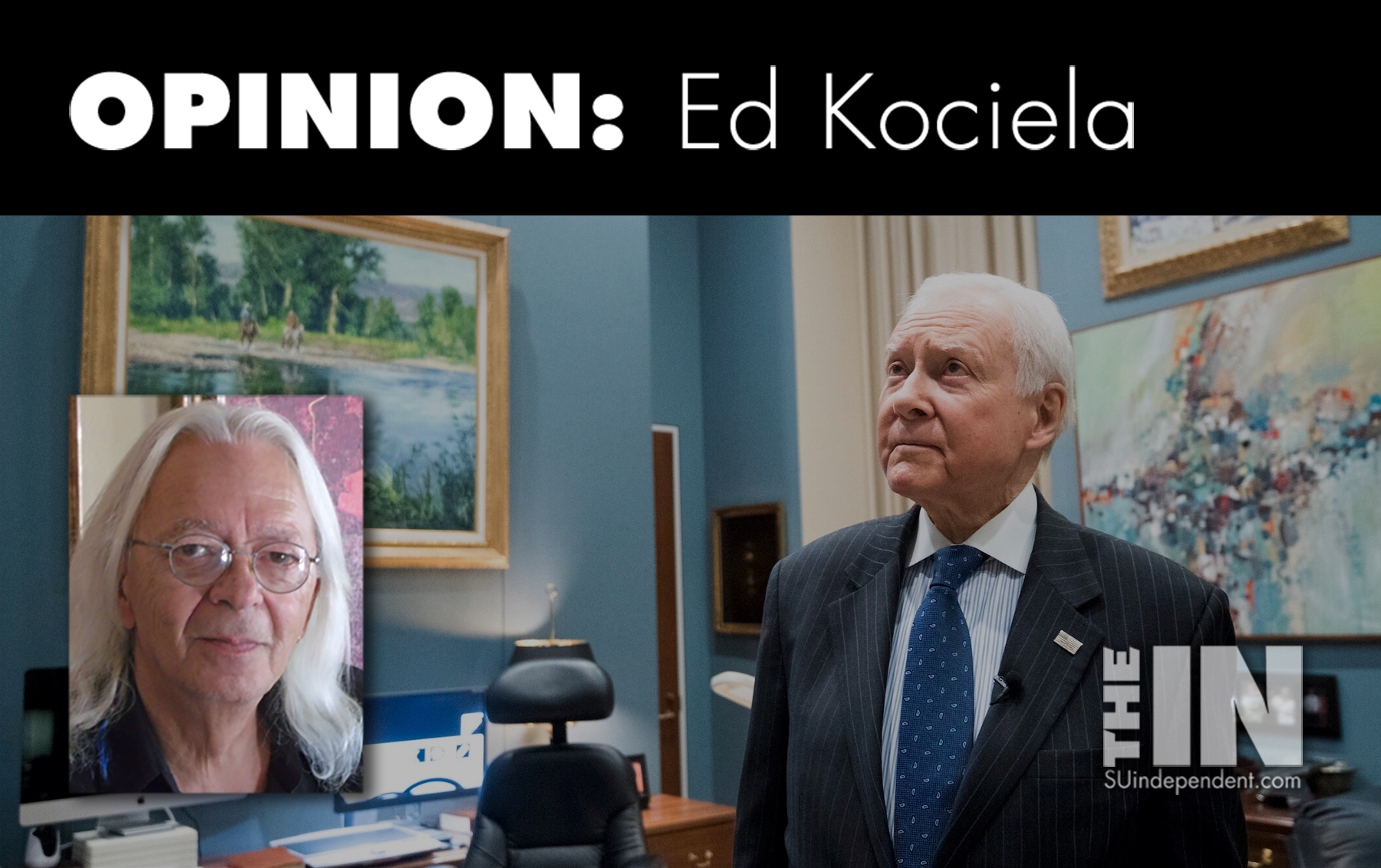
A Lion Of The Senate
– By Ed Kociela –
Somewhere in the stack of memorabilia that I have collected over the years is a bundle of personal handwritten letters sent to me from Sen. Orrin Hatch.
Some were, of course, related to politics.
Others were deeply personal messages.
Senator Orrin Hatch and I were at opposite ends of the political spectrum, to be sure, but despite all of that, I was saddened when I heard of his passing on Saturday.
He was a friend.
As City Editor of The Spectrum and Daily News, I was also a member of the editorial board. The senator would make frequent trips to St. George to visit with us. These were official visits with the board to help us wrestle with the oft-difficult job of writing the newspaper’s editorials. And, the senator and I would often go toe-to-toe on the issues in verbal jousting that was a result of our differing viewpoints.
I can remember learning a lot from the senator during these sessions, whether it was regarding stem cell research, which he supported, or the Affordable Care Act, which he did not.
Time after time I was taken in by his charm.
There is always a bit of tension in the room whenever a politician sits down to talk to the media. The senator, however, who stood before the cameras and gone one-on-one with some of the best political writers and analysts in the business, always seemed in his element. He enjoyed the exchanges, the parrying, the hard questions. He didn’t dodge our questions or bury his answer in long-winded, exhausting spin. He would make his point quickly and clearly and be ready for the next question. He was a stand-up guy whose charm, wit, and curiosity about the world around him made those visits special.
Sometimes, his visits were merely pop-ins when he was in town, often for a quick hello and handshake to catch up with each other. I remember him once hiding around the corner from my desk and jumping out to surprise me during one of his social drop-ins. I remember being called to the front desk numerous times because I had a visitor, who happened to be the senator who was in town on some other business and just wanted to say hello. And, any time we needed him as a source for a story, he was there. He didn’t dodge calls or pawn off responses to his aides, didn’t rely on communicating through press releases. He did it the old-fashioned way — direct conversation. He never once avoided an interview with us or postponed a chat because he was working with CNN or The Washington Post or The New York Times.
I remember once pinning him down about his tenure in the Senate. He was, as I am sure you read elsewhere, the longest-serving Republican senator in history, occupying his seat for 42 years. The whole premise of his first campaign for political office was that the three-term Democrat had been in office too long. “What do you call a senator who’s served 18 years?,” he asked during that initial campaign that launched his political career. “You call him home.”
He looked at me steadily, nodded, and said “Good question. What I didn’t take into account at the time was the fact that the longer you are in the Senate, the better the committees you get to sit on, and the longer you are in the Senate, the more you learn about how it operates, which means that I can do more for Utah with that experience and knowledge.” It is a rationale that resonates even with those who favor term limits. The senator was a member of the most prestigious Senate committees, from Health, Education, Labor and Pensions to the Judiciary Committee and Finance Committee.
We differed when it came to the economy and the environment. But, he taught me a thing or two when it came to science and I admired his compassion when he dealt with issues regarding our children. It was courageous for him to be the force behind the Radiation Exposure Compensation Act of 1990, which has paid more than $2 billion to those who contracted cancer as a result of the nuclear detonations and uranium mining during the Cold War.
After we had gotten to know each other pretty well, he would always end our meetings with a handshake, look me in the eye, grin and say “Someday, I am going to turn you into a conservative,” to which I would always reply, “Nah, senator, some day I am going to turn you into a liberal.” We would laugh and he would be on his way. I don’t know if it is exactly the way he would part after going to dinner with his close friend Sen. Ted Kennedy, but I sort of liked the idea that he may have used the same line on him. The two men forged a relationship that allowed them to shatter the gridlock that so often strangles legislation, working on the concept of mutual compromise and consideration that was based on the good of the nation rather than political one-upsmanship or stroking their personal egos.
That’s why, despite the cavernous abyss between us politically, I admired him. He was, among modern politicians, a statesman, a man who took his position and responsibility seriously; a tenacious opponent; a student of the human condition who understood that he didn’t always need to go to the jugular to make his point. That made him rare. In fact, I cannot name one other member of Congress who I would describe as a statesman.
During his later years he drifted a bit into the Trumpian fold, but I never bought it. The senator saw how the Utah fringe-hangers had destroyed the career of longtime Senate friend Bob Bennett, a man of traditional Republican values in every sense of the word, and ran him out of office. Not wishing for such an ignoble exit he publicly cozied up to the president a bit, while still having harsh words for his behavior. His heart never really seemed willing to continue with that particular compromise, which, I’m pretty sure, made him eventually decide to hang it up.
In his final speech to the Senate, he hinted at such.
“No matter how often I come to speak at this lectern, I experience that feeling — again and again,” he said. “But today, if I’m being honest, I also feel sadness. Indeed, my heart is heavy. It aches for the times when we actually lived up to our reputation as the world’s greatest deliberative body. It longs for the days in which Democrats and Republicans would meet on middle ground rather than retreat to partisan trenches.”
For Orrin Hatch it was, I believe, a life well-lived. The only thing I think he was disappointed in was the fact that he never got a nomination to the Supreme Court. As a legal scholar and with his knowledge, respect, and love for the law and the United States Constitution, I think he would have made an outstanding justice.
As it was, he turned out to be an outstanding senator.
More importantly, he was an outstanding human being.
Rest in peace, senator.
Viewpoints and perspectives expressed throughout The Independent are those of the individual contributors. They do not necessarily reflect those held by the staff of The Independent or our advertising sponsors. Your comments, rebuttals, and contributions are welcome in accordance with our Terms of Service. Please be respectful and abide by our Community Rules. If you have privacy concerns you can view our Privacy Policy here. Thank you!
Click here to submit an article, guest opinion piece, or a Letter to the Editor




